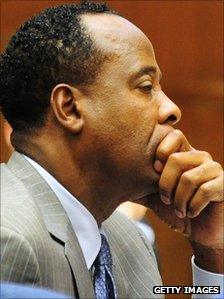Michael Jackson did not cause own death, says doctor
- Published
Dr Christopher Rogers: "It's reasonable to believe that the doctor had an imperfect control over the dose"
Michael Jackson could not have given himself the powerful anaesthetic that caused his death, the medic who carried out the singer's autopsy has testified.
Dr Christopher Rogers said it was more likely Jackson's personal physician Conrad Murray mistakenly gave him too much of the drug propofol to try to help him sleep.
He added Dr Murray had no precision dosing device in Jackson's bedroom.
Dr Murray has pleaded not guilty to involuntary manslaughter.
His lawyers claim Jackson gave himself the fatal dose while Dr Murray was out of the room.
The doctor told police, in an interview heard in court last week, that he was away from Jackson's bed for only two minutes on 25 June 2009 to go to the bathroom, and returned to find the singer was not breathing.
However Dr Rogers testified that Jackson - who was already heavily sedated - would not have been able to inject a lethal dose of propofol before Murray returned.
"The circumstances, from my point of view, do not support self-administration of propofol," the chief of forensic medicine at the Los Angeles County Coroner's Office said.
Dr Murray has admitted to giving Jackson 25ml of the drug to help him sleep, and would have had to give regular extra doses to keep the singer unconscious.

Dr Murray has pleaded not guilty to involuntary manslaughter
Dr Rogers said evidence found in Jackson's bedroom included an empty 100ml bottle of propofol.
But he noted that as Dr Murray had no accurate equipment to check the doses being administered, "essentially, the doctor would be estimating how much propofol he was giving".
"I think it would be easy under those circumstances for the doctor to estimate wrong and give too much propofol," Dr Rogers said.
He also noted the lack of sophisticated medical equipment in Jackson's bedroom where the drugs were administered, such as resuscitation equipment.
Dr Rogers said the cause of death was "acute propofol intoxication", ruling the death a homicide.
The trial in Los Angeles Superior Court is expected to last five weeks, until the end of October.
If Dr Murray is convicted, he faces up to four years in jail.
- Published12 October 2011
- Published8 October 2011
- Published8 October 2011
- Published6 October 2011
- Published4 October 2011